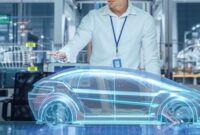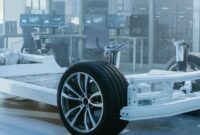:
Autonomy Towards the Future: Challenges and Opportunities of Driverless Vehicles
Vehicles as Connectivity Centers
The autonomous vehicle revolution is not only changing the way we drive, but it’s also changing the way we interact with technology. Modern cars have evolved into a hub of connectivity that connects us to the digital world. Increasingly advanced connectivity features allow us to stay connected, entertained, and productive while in the car.
Infotainment Systems: More Than Just Entertainment
The infotainment system in modern cars has far gone beyond the traditional entertainment function. High-resolution touchscreens, smartphone integration, and various apps have transformed car interiors into smart cockpit spaces. Features such as cloud-based navigation, streaming music players, and virtual voice assistants have become standard.
However, infotainment systems also bring their own challenges. The complex user interface and too many features can confuse drivers and distract them from the road. In addition, integration with various external devices also increases the risk of interference with vehicle systems.
Over-the-Air (OTA) Software Updates: Cars That Are Always Up to Date
One of the main advantages of modern vehicles is the ability to receive software updates over-the-air (OTA). Similar to smartphones, cars can receive feature updates, bug fixes, and performance improvements without the need to visit a repair shop. OTA updates allow automakers to continue developing vehicles after they are sold and provide an even better driving experience for consumers.
However, OTA updates also raise some concerns. Updates that don’t run smoothly can cause problems with the vehicle, such as losing functionality or even causing accidents. In addition, the potential for cyberattacks is also a serious threat, as software updates can be an entry point for hackers to access vehicle systems.
Cybersecurity: Protection of Personal Data
Modern vehicles collect a large amount of data about the driver and vehicle. This data may include location, driving habits, entertainment preferences, and other personal information. Data security is a major concern, as data that falls into the wrong hands can be misused for various purposes, such as identity theft or espionage.
Automakers and tech companies are working together to develop robust cybersecurity systems to protect vehicle data. Encryption, two-factor authentication, and regular security updates are some of the steps that can be taken to prevent cyberattacks.
Potential Data Misuse:
In addition to cybersecurity concerns, there are also concerns about potential data misuse by car manufacturers and third parties. Vehicle data can be used for consumer profiling, targeting ads, or even manipulating driver behavior. Clear regulations are needed to protect consumer privacy and prevent data misuse.
Integration with Smartphones:
The integration of smartphones with car infotainment systems has become a standard feature. Features such as Apple CarPlay and Android Auto allow users to access their favorite apps directly from the car’s screen. However, reliance on smartphones also poses several problems, such as driver distraction and potential connectivity issues.
Data-Driven Services:
The data collected by vehicles can be used to offer a variety of data-driven services to consumers. For example, data about driving habits can be used to provide vehicle maintenance recommendations, while data about location can be used to offer more personalized navigation services.
Challenges and Opportunities
Connected vehicles offer many benefits, but they also present complex challenges. Some of the main challenges that must be overcome include:
- Cybersecurity: Prevents cyberattacks that can compromise the user’s vehicle and personal data.
- Data privacy: Protects users’ personal data from misuse.
- Standardization: Develop consistent standards for vehicle infotainment and communication systems.
- Infrastructure: Ensuring the availability of adequate infrastructure to support connected vehicles.
The Future of Vehicle Connectivity
The future of vehicle connectivity looks very promising. With the acceleration of technological development, we can expect the emergence of new features that are more advanced and innovative. Vehicles of the future will become increasingly intelligent, connected, and personalized.
Topics That Can Be Further Developed:
- Vehicles as a platform for new services: How vehicles can become a platform for services such as freight delivery, ridesharing, and entertainment.
- The impact of connected vehicles on smart cities: How connected vehicles can contribute to the development of more efficient and sustainable cities.
- Ethics of autonomous vehicle development: Ethical issues related to the development of autonomous vehicles, such as legal liability in case of accidents.



